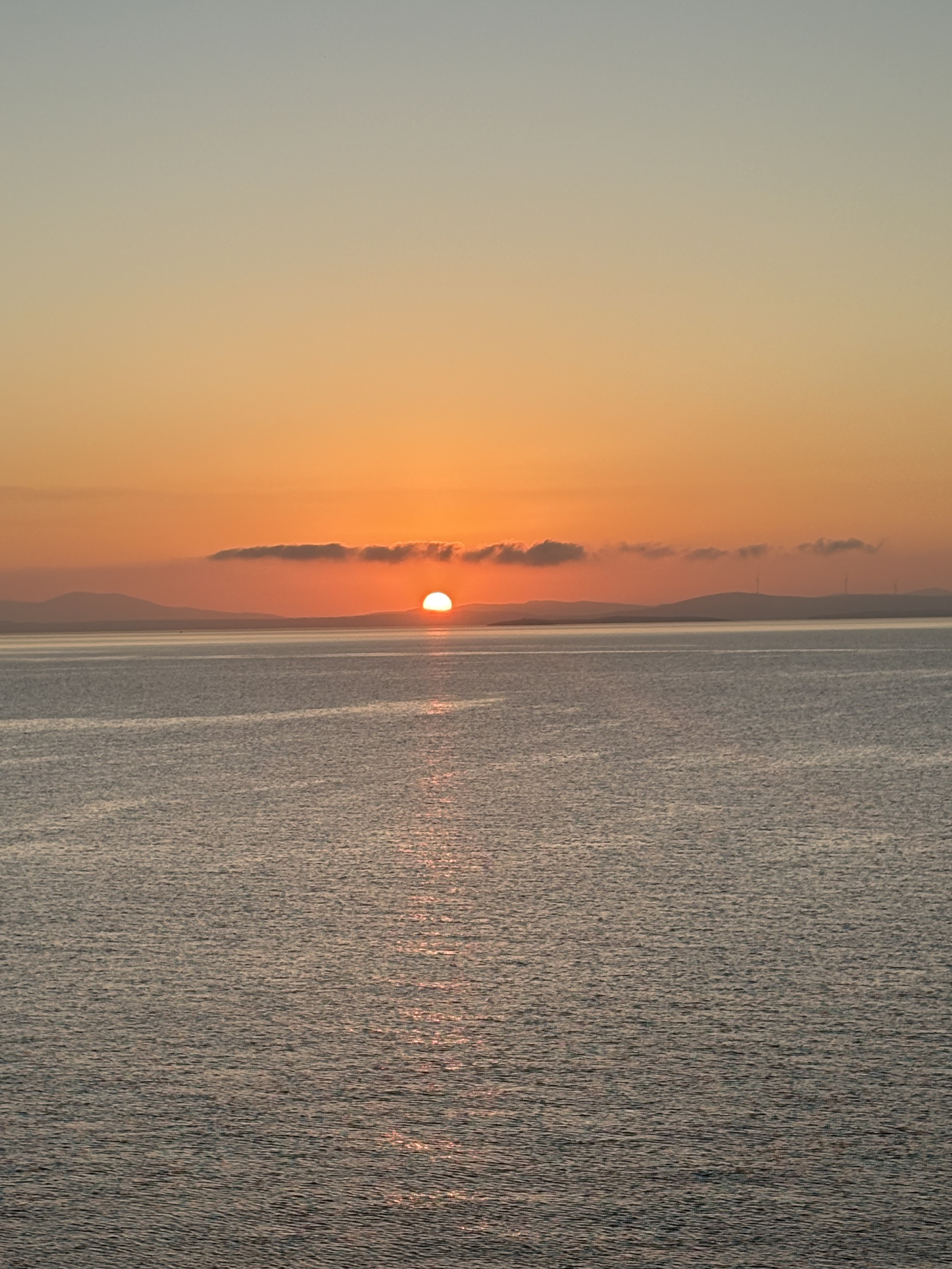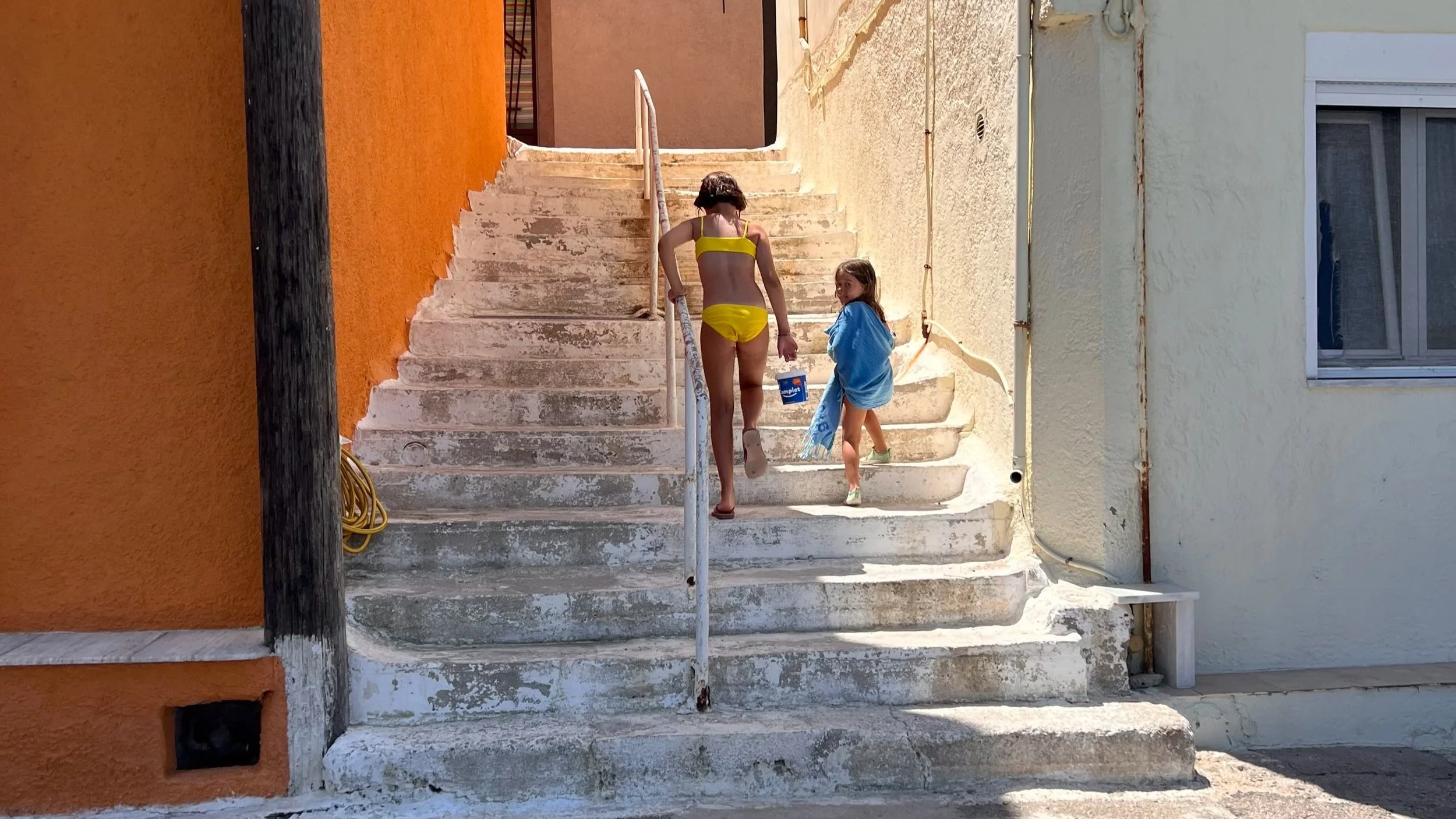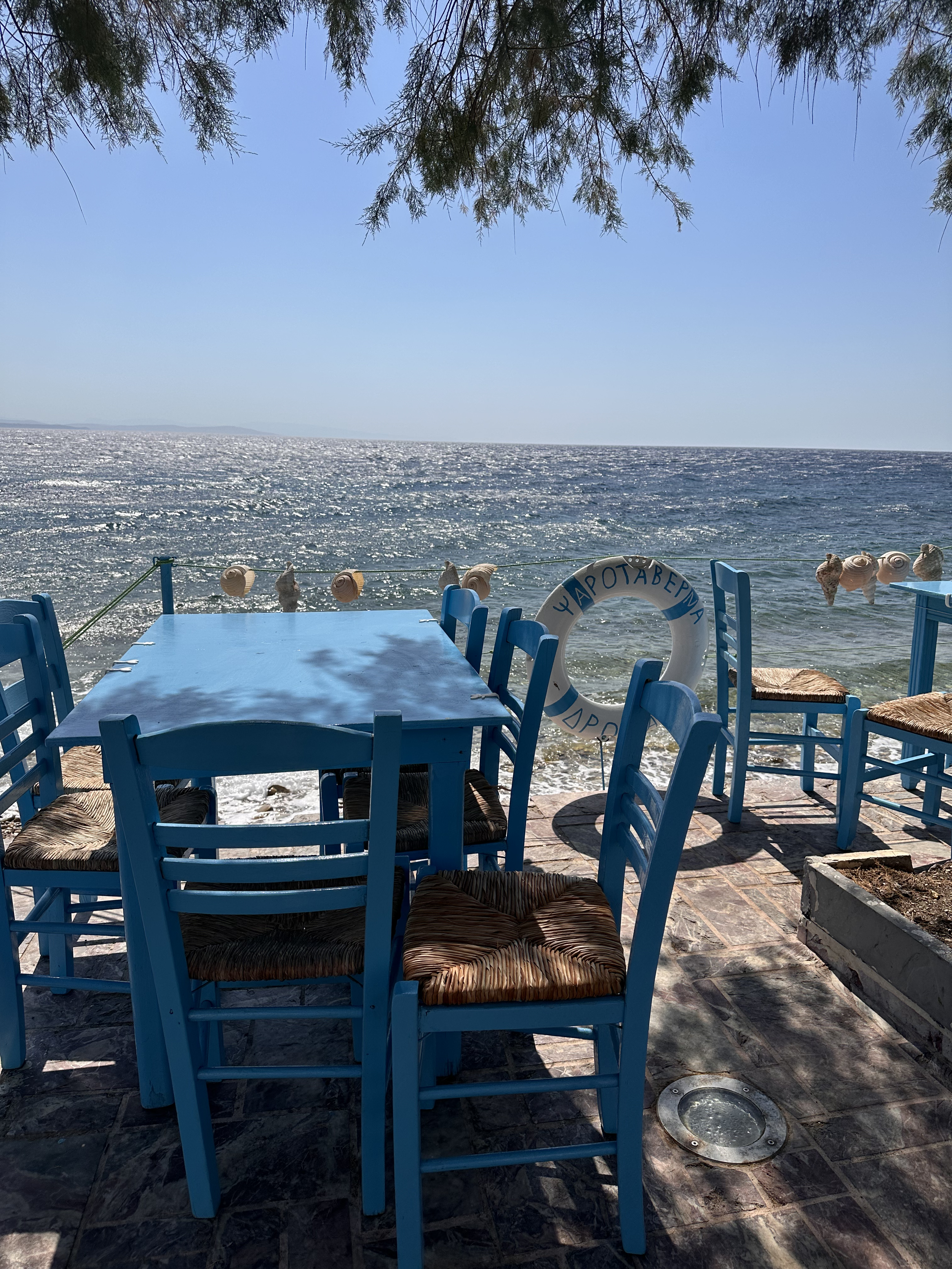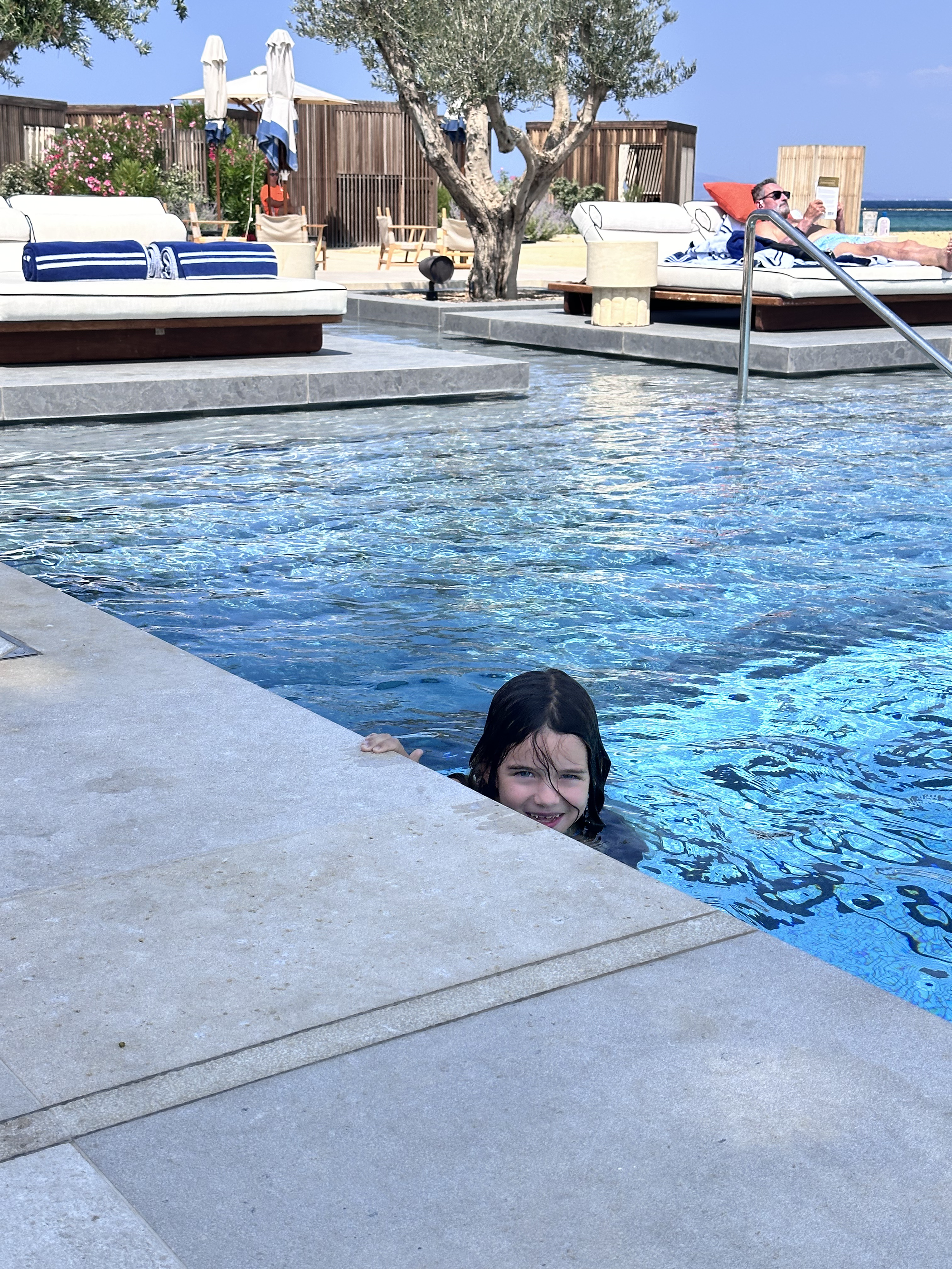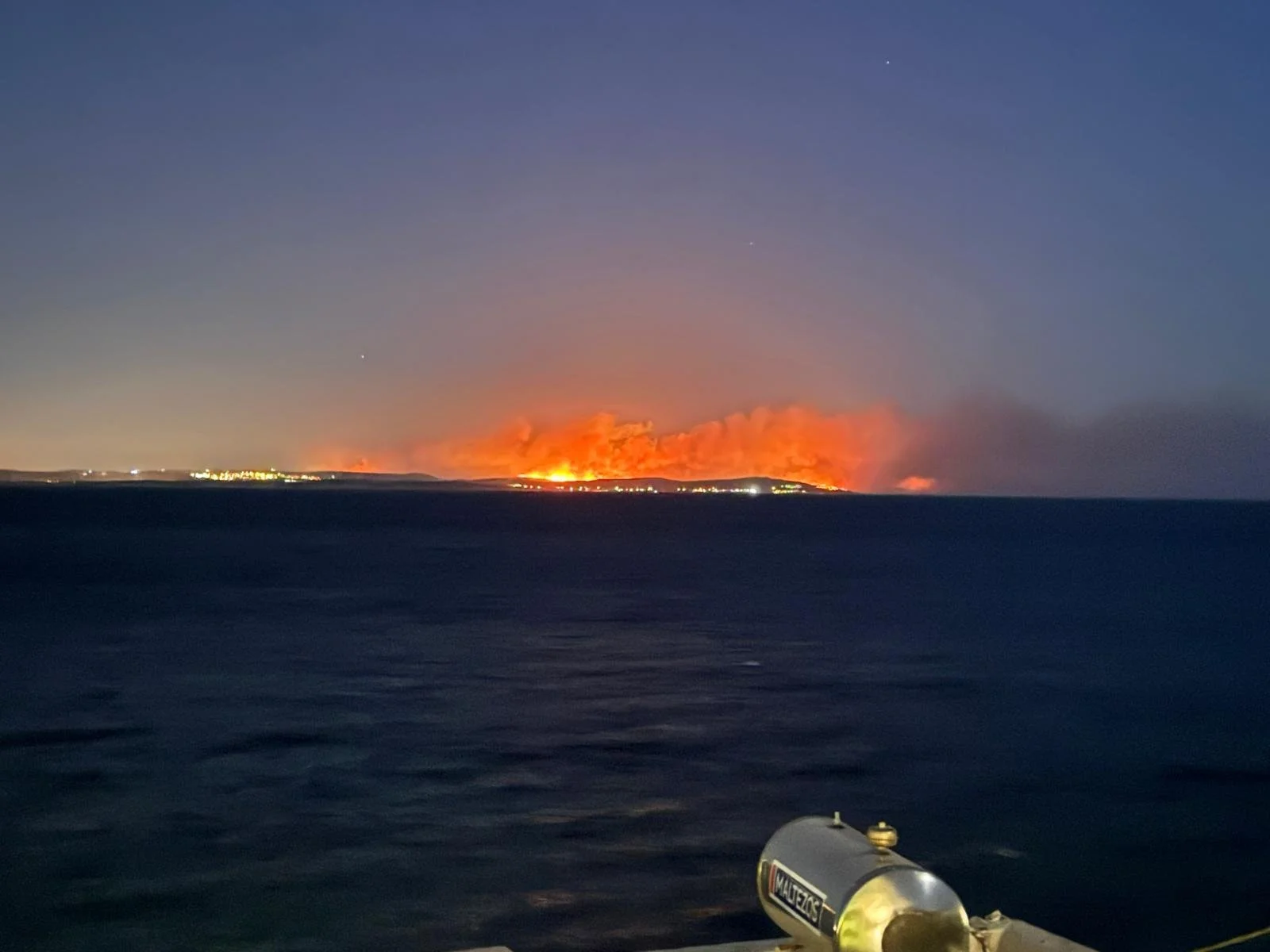The Island - the space inbetween.
Around 6am the sun rises above the low mountains of Turkey straight across the water, an electrifying ball of red and orange. The sky is a concentration of neon like pink over watery blues. To the left the mountains are high and majestic, edged in purple in the morning haze.
Look out across the north East Aegean to Izmir, Turkey.
The sun is impatient to rise, within 40 minutes or so, it has transformed into a dazzling golden yellow ball, higher in the sky. It is like a mass of diamonds pouring down onto the sea, endlessly dancing across the water, brilliant and bright. Swallows swoop and play in pairs, sharp shapes, sweet calls. To the right, the olive green shoreland of the island, with small grey stone houses dotted in and out of the trees. The earth is dry and brown in-between the trees.
The wind is gentle today, no meltemi winds, just lapping at the rocks in front. The sea is empty apart from one large ferry likely headed for Piraeus, a small yacht in the distance and what looks like a small fishing boat nearer to the shore. Empty space, the big blue. I gaze out at the endless expanse of sea and sky, the constant motion of the waves, surreal shapes and light dancing across the water feels psychedelic and other worldly. Like they are pulling me in, and I might disappear into that blue space.
“I oscillate between feeling a deep, peaceful connection to the land of my ancestors and then also completely displaced, like I don’t belong anywhere anymore. This makes me feel hopeless.”
The sea feels melancholic, maybe it’s the colour blue. I think of something I read by Bella Freud once, she said she loves Paris, but whenever she is there she feels intense loneliness.
By 8am the sun is blazing white hot and very high, the cicadas loud and relentless with their rhythmic chants, alerting us that it’s going to be a hot day.
I walk through the small stone streets to the village store. A cacophony of small houses jumbled up. Some built in beautiful old stone, ornate window frames, others constructed in cheap cement. Some modernized and more minimal, the hot pinks of bougainvillea crawling around buildings, small terraces tucked into corners, covered in grape vines, the smell of the dry herbs, pots of basil here and there. Small patches of land occasionally between houses. Random pieces of rusted machinery or tools dumped amongst dried grass, others with carefully planted rows of vegetables and fruit; tiny patches of land with mandarin and lemon trees. Rubbish littered around the edges of the road, cats lazing under large pick-up trucks squeezed into small spaces and banged up old cars.
I hear a dog bark and a motorbike buzz along the sea front, but other than that the village is quiet save for the chanting cicadas. The village will come to life after sunset. Houses that appear derelict, will suddenly have lights on, or host a group of people sitting outside in plastic chairs enthusiastically chatting. Shutters up and tv noises coming from inside, or out on the small terraces. Children riding bikes and playing, the fish restaurants heaving with people, some dressed up and others arriving straight from an evening swim at the beach.
As I enter the small shop there is a great stack of freshly delivered mail, sounds of laughter and joking. It's mail day.
There is no such thing as addresses in these villages. The address is your name and the village. That’s it. There is a way to hide here, you must be seen. The village shop and others will help to unofficially distribute the mail. Human contact is still the currency in these villages; there is no hiding behind your online delivery order at home. Everyone knows who you are and keeps an eye on your comings and goings.
Nothing moves fast, a raised eyebrow, a nod, a long stare. Slowly the café owner rises to say good morning and ask what coffee we want.
“Here we move to the rhythm of the island, time doesn’t obey our fixed schedules. Some days the slowness has been excruciating on my body and mind after a lifetime of busy Asian cities, but there is no use fighting it, we must surrender to nature’s time here.”
The kids play happily with their cousins, all tears from Singapore forgotten for now. They explore the small village streets in the warm evening air or laugh and scream and run in the village playground.
During the day we swim in the sea, icy cold waters with volcanic rocks - the children look browner after just a few days.
We eat freshly caught squid, fish, mussels, from the waters outside our village, endless ice-creams and local juices of Mandarins and lemons.
We watch the small wooden fishing boats putter out to sea nightly, old leathery faces of men, creased by years at sea. Some we recognize - the taxi driver, the man from the coffee shop.
We go to the village church on Sundays to hear the ancient orthodox chants, the old women fanning themselves in the heat. We kiss the icons and make our cross, smell the rich scent of frankincense and myrrh, and afterwards we drink sweet Greek coffee and eat the cookies offered.
“I sit and listen and talk with the women in my family, hearing their news. An ease of familiarity, people I have known my whole life, an acceptance of each other, faults and all, years of history together, heartbreaks and celebrations, many shared values, which I am thankful for. ”
I feel a constant syrupy tiredness; my body is so heavy. I can’t shake the tiredness, no matter how much or little I sleep. I feel all the layers of tiredness from months of endless preparation for this move, the uncertainty, the surrender to the not knowing, the paperwork, the bureaucracy, the roadblocks. The unraveling of a life lived, melting away and allowing the oozing empty space to fill me.
In the afternoons I feel the gentle whirl of the fan as I lie on the bed to rest, shutters half down, the room dimmed, finally a respite from the screaming hot sun, the darkness calms me. I drift into strange dreamscapes, fragments of my life, memories across countries and times.
I am speaking Greek, then English, words muddled in my mind. I often wake wondering where I am. I dream of rain - big tropical humid storms, large rain drops, or sometimes the cold drizzle of England.
Back to Athens
I pop on my sunglasses so I can people watch; I still feel dusty. I bought these overpriced branded glasses as soon as we arrived back in Athens. I barely wore sunglasses in Asia, but here in this screeching brilliant light, even I submit to sunglasses some days.
I watch a young couple at the poolside. Impossible to tell their nationalities. They have the look of international wealth, a quiet confidence, carefully chiseled features, a light dusting of a tan from summer yachts and winter skiing, a life lived across continents.
The hotel is an exhibition of knitted Missoni beach cover ups, Pucci swirls and small Birkin bags adorning young lithe women with silky hair and middle-aged leathery men in white linen, younger men with carefully manicured stubble, chiseled edges and open shirts.
A steady stream of blacked out range rovers and Mercedes cars arriving and leaving, parked by men dressed in black with earpieces standing around. The Mediterranean glitterati. Here wealth is to be fully displayed. It feels strange eating at white tablecloths, with waiters hovering to fill our wine glass, a world away from the island fish tavernas and village cats at my feet.
I go shopping with my oldest daughter and suddenly realize with hopelessness that I can’t find her sizes so easily. The wracks of clothing are not full of extra small sizes like in Asia, instead medium and large. I sigh. Of course, good for me, but not for her.
We go for sushi one night; the children request it. Everyone leaves disappointed, it feels like supermarket sushi to us. The children talk about all their favourite foods from Singapore and Asia, all the flavors we miss. Everyone looks glum that night, even with the most beautiful champagne golden sunset across the beach.
We take the 9-hour pilgrimage on the large blue star ferry back to the island. My children are excited, it’s the first experience for them on a big ship. This is always how we traveled when I was a child between mainland and islands, never flying. Jostling my way on to the ship with my grandma, snatching the best places to lay our blankets for the journey. The ship creaks and shudders with its slow rolling sensation, the smell of diesel and the rhythmic deep thud of the engines. An eclectic mix of people throughout the ship’s corridors, gypsies, old grandmas, families, tourists, even once long ago, I saw long rows of handcuffed prisoners being transported on the ship and marched down the long narrow corridors.
The Fire
We arrive back with our dog, family complete, happy to be back on the island. The Mediterranean glitterati bores us after a while.
But then a sadness fills me. Everything has gone from Singapore.The dog isn’t even there now. We have really gone.
Life continues - late nights in the village playgrounds, swims at dusk watching sun go down and the moon rise over the water, my son fishing nightly in the small port in the village, surrounded by family, a feeling of comfort.
The days become very, very windy and unbearably hot. The meltemi wind is relentless, it bangs at anything loose, our garage doors clang relentlessly and can be heard from two floors up. The wind tires me. I want it to stop. I hear it at night, banging and clanging, during the day it whips around the silent village streets, ghost like, whispering in my ear.
My husband and oldest daughter leave for London.
I walk out onto the balcony and the dog sniffs the air incessantly. A huge plume of black smoke rises from the hill across from our village. My phone signals the short sharp emergency alert sounds for evacuation orders for an area very close to the main town. For the next 6 days the island battles one of the worst fires they have ever had. Five or six fires ignited simultaneously across the island. It approaches the main town. It spreads behind us, where villages are evacuated.
I move in and out of very light sleep through the nights, often woken by my phone’s emergency alerts blaring to evacuate another area and instructions to take shelter in a gym, or government building.
Every time the alert sounds, my body feels tight. I can't eat much during the day. I go outside and the smell of burning is stronger; it hurts my eyes and throat.
The villagers say it's ok, that we are safe here by the ocean. But all I can see are those apocalyptic images of Mati in 2018. The smoke black on the beach, people drowned, cars gridlocked and whole families burned alive, my body feels cold.
It feels like the whole of Greece is burning. I see constant media reports of fires across the country and our neighbors in Turkey, Italy, Albania and more.
Meanwhile I see floods across many Asian countries as they are pummeled with a strong typhoon making landfall across southern China, Hong Kong, Philippines and Vietnam. I can barely remember the feeling of rain in this dry parched land.
Every day I get up early at 5am as the sky begins to lighten and watch the sun rise over the east Aegean Sea.
Shortly after 5am I hear them start again; helicopters, and the Canadair Sea planes. I know the fire must be very close now. They come directly over our house, very low, the noise is deafening. The strong sound of the blades and the engine.The dog whines and whimpers.
They come right into our bay and slowly lower down.The winds are ferocious, insistent, pushing on them. Sometimes they slide across the water. But mostly they make the landing look easy as they scoop up the sea water.
I know it’s not easy. I know these pilots are risking their lives to do this work. I say a silent prayer for them all, all over the country. Then they fly back into the fire and smoke with little visibility, low over large mountainous regions to drop the water.
Every 5 minutes or so they come into the bay. The Canadair planes go a bit further out in the bay. The helicopters are very close, like giant insects landing on the water in front of me. They don’t stop until 8pm, after that the visibility isn’t good enough as the sun lowers.
We watch them from google maps landing back regularly at the small island airport for constant refueling. They don’t stop. I wonder about the stress on their minds and body. I think of the men on the ground fighting the fire too.
They tell me in the village; we are lucky, the wind pushes the fire back from us. And if the wind changes I ask? They simply shrug their shoulders and look up to the sky. I nod. I know the answer.
Every night a group of around 50 men from the village with pick-up trucks and water containers patrol the perimeter of the village. They keep very careful watch in case the fire breaks the hill behind us.
We hear stories of villages in more remote places fighting off the fires before the fire trucks can get there. Other stories of farmers trying to save their goats and sheep, but they can't. The fire is too strong, people having to pull them back from their animals, the pain, the suffering. I can feel it sharply in my body.
My son is very distressed about the animals, he says people won’t try to save them. I assure him they are trying to save everything they can, even one goat they will try to save. This land is people’s whole lives. This beautiful wild raw island. No fancy resorts, little tourism, just wild pure nature. The locals fought hard to stop mining activities here that would destroy the nature, it’s not even covered in those ugly windmills like much of the mediterranean.
We visit my cousin's house in the village so the children can play to take their mind off the fire. The kids run about playing cops and robbers on the small village streets around the houses. I sit on the small terrace surrounded by potted plants, the smoke is quite heavy now, ash falls. My throat feels sore. I want to take my kids inside, but I know they are happy playing.
Night falls and as the wind drops the smoke becomes thicker, we start to head home. I can see the orange glow in the sky behind us.
Before the kids sleep they ask me will we be safe from the fire. I assure them they are safe, and I am happy they sleep peacefully. But as I lie next to them, drifting in and out of a light sleep, rising occasionally to check the windows, I feel dishonest. I don't really know the answer.
Another evening, we go to a beach very close by. The smoke is insistent; the helicopters and planes relentlessly fly over us into this bay and our village bay next to us. Sometimes the kids stop and watch them, other times they run and swim as if nothing is happening. I don’t swim; no adults do, everyone looks drained. As we leave and darkness takes over, I see the glow of orange behind the hill. The fish restaurants are very empty in the village, and the smoke worsens, giving a grey sheen to the village streets.
After 6 days the fire is finally out. I see the scorched mountains as I drive into town.
About a week later, the sky is bright orange at night across the water in Izmir, we smell the smoke and hear about villages burned. My heart feels heavy and aches as I think of those across the waters suffering so close, villages my ancestors once lived in before they came to this island as refugees, when their villages were burned and they were thrown out.
Summer continues, but Athens beckons..
I sit out in the warm evening air and look across the bay, lights twinkling at all the small villages along the shore. I see the lights of Turkey opposite and the sea, black and empty. I can feel a low rumbling anxiety, I know the next phase is imminent. The container is arriving after I watched its slow chug up to Shanghai, back down to Malaysia and around Africa and then creeping into Europe. I don’t even want to see my things, like a painful reminder of the old life I loved. But there are school items to prepare, new routines to unfold, and a new apartment to make home. I can hardly bear the thought of closing up our house here and packing suitcases again, for what seems like the hundredth time.
I reflect on how the things we often love as a visitor to a place, can be the very things that challenges us most when we live there. I think about all the things I have been grateful for this summer; and this great empty space that filled me, allowing my old life to dissolve. Excruciatingly painful at times, but necessary.
Now we head to a busy chaotic city but with very different rhythms to those modern, efficient, busy metropolises of Asia. This one is steeped in ancient ruins, sprawling horizontally rather than vertically. Daily strikes and protests. Potholes and uneven roads. Culture and passion, edged by mountains with pine trees on one side and sea on another connecting back out to the hundreds of islands that nearly all locals have strong connections with.
I can’t really imagine what my life will be like, but I feel a tinge of hope now, finally.

